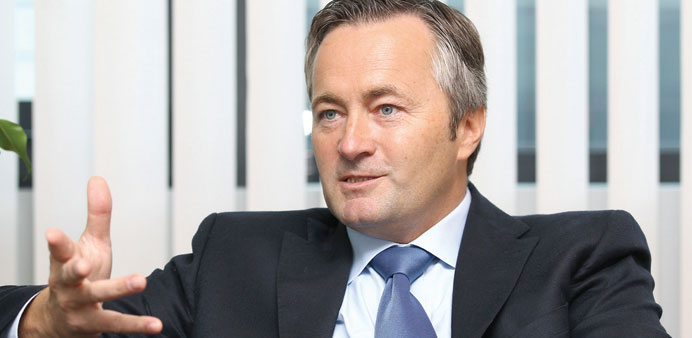Telekom Austria chief executive Hannes Ametsreiter said on the sidelines of the European Forum Alpbach in Austria that the rapid growth seen in the past is over.
Reuters/Alpbach, Austria
For Austrian companies the party in central and eastern Europe (CEE) is over — or at least postponed for years — after decades of investing and raking in huge profits in a region now spawning write-offs and witnessing rising political turmoil.
Bankers and business leaders are questioning Austria’s traditional strategy: aggressive expansion in what many see as their back yard, the countries once part of the Austro-Hungarian empire which collapsed nearly a century ago.
Ukraine’s political crisis and a Russian economic downturn pose major risks for Austrian companies with big exposure there. Goods and services worth €3.5bn ($4.60bn) went to Russia in 2013, but exports fell 11% in the first third of this year, Austria’s business lobby WKO has said.
“The rapid growth we might have seen in the past is over,”
Telekom Austria chief executive Hannes Ametsreiter said on the sidelines of the European Forum Alpbach in Austria, adding that the culture and history of Austria meant it was well-adapted to expand into the region.
Telekom Austria wrote down its Bulgarian unit by €400mn in June, setting it on course for a 2014 loss.
Austrian banks, such as Raiffeisen and UniCredit Bank Austria, are the biggest EU lenders in CEE and the former Soviet republics, with loans worth around €202bn in 2013, Austria’s central bank says. Its financial sector established itself in the region even before the Berlin Wall came down, but it faces a rethink as some investments go bad.
Erste Group, emerging Europe’s third-biggest lender, is on course for a record loss this year after writing down businesses in Romania and Croatia and setting aside €130mn for a Hungarian law forcing banks to compensate customers for mispriced loans.
Volksbanken has written off its Romanian business entirely, while Hypo Alpe Adria, which was nationalised in 2009 after a decade of breakneck expansion in the Balkans, has taken €5.5bn in state aid since 2008.
Austria’s central bank governor Ewald Nowotny said that even though companies’ day-to-day business was holding up in Russia, there was little reason to expect expansion in the long run.
“The really big point is that investment projects are stopped,” he told reporters in Alpbach.
Fears of a spiralling conflict on the Russia-Ukraine border have curbed trade, rocked currencies and damaged consumer confidence in the region.
Poland has already seen exports to Ukraine and Russia fall considerably, said central bank Governor Marek Belka at Alpbach.
“(Investors) are asking us simple and rather bland questions ... will there be war? If the question is asked there is always a doubt whether an ambitious and more risky investment project will be launched. We already see private consumption slowing down.”
In the energy sector, Austria has benefited from its links to Russia’s Gazprom, which pumps large parts of its gas for the European market through the country.
South Stream, a $40bn pipeline project, would bring enough gas to meet almost 15% of European demand and increase Austria’s standing as a gas centre. But it has raised eyebrows in Brussels, which might withhold its green light for the project, at a time when the European Union is trying to reduce its dependence on Russian gas and has imposed sanctions.
Parts of South Stream are being built with Austrian products. Voestalpine, which is delivering steel plates for the pipeline, sees its presence in the region as limited, but has to stay alert.
“The more important side actually is Ukraine, where we get about 30% of our ore,” Voestalpine chief executive Wolfgang Eder said. “Eastern Europe is difficult for us at the moment because we simply don’t yet have the big draw of our clients in that direction.”
The lack of a firm legal framework in some eastern European countries poses a considerable risk.
“The framework gets changed all the time,” said Wolfgang Anzengruber, CEO of utility Verbund. “In this environment now you cannot go into these countries with a clear conscience.”
With European investors growing more hesitant about CEE, the region is under pressure not only from the Russian-Ukraine conflict, but also from problems in western Europe.
“We don’t have a booming economy in the euro area ... that’s why the disappointment in Ukraine and Russia weighs double on expectations (in CEE),” said Stefan Bruckbauer, chief economist at Bank Austria.
There is still growth potential, he said. Telekom Austria sees pay TV and cloud computing as growth markets in Eastern Europe. But the region will not replicate its growth from 10 years ago. “This is a realisation that one was a bit too optimistic,” Bruckbauer said.

